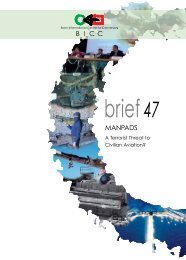egypt-final-presidential-elections-2012
egypt-final-presidential-elections-2012
egypt-final-presidential-elections-2012
You also want an ePaper? Increase the reach of your titles
YUMPU automatically turns print PDFs into web optimized ePapers that Google loves.
The Carter Center<br />
Civil Society Organizations<br />
Deborah Hakes<br />
Civil society organizations are important stakeholders<br />
in the election process. If allowed to<br />
operate freely, they can perform key functions<br />
that lend credibility to the electoral process.<br />
Over the course of the <strong>presidential</strong> election, Carter<br />
Center witnesses observed a low level of domestic<br />
and international CSO engagement. Primarily they<br />
functioned as a watchdog for the election process<br />
and, in some instances, contributed to voter and civic<br />
education. Carter Center witnesses attempted to meet<br />
with CSOs across the governorates in which they<br />
deployed. Below are the principal findings of The<br />
An Egyptian election witness keeps a tally of the votes during<br />
the counting process for the first round on May 24, <strong>2012</strong>.<br />
Carter Center with regard to the role of civil society<br />
in the <strong>presidential</strong> election.<br />
The PEC named the state-affiliated National<br />
Council for Human Rights (NCHR) as the body<br />
responsible for collecting, examining, and approving<br />
the applications for individual, domestic witnesses.<br />
Altogether, the NCHR approved around 9,700<br />
national witnesses. 137 This is a significant reduction<br />
when compared to the parliamentary <strong>elections</strong> during<br />
which the NCHR accredited 130 national CSOs<br />
representing 25,000 national witnesses.<br />
The PEC had responsibility for reviewing and<br />
approving applications to witness the <strong>presidential</strong><br />
election from international CSOs and issued individual<br />
accreditations for international witnesses.<br />
Altogether, only three international organizations<br />
applied and were accredited. They included the<br />
Electoral Institute for Sustainable Democracy in<br />
Africa (EISA), the Election Network in the Arab<br />
Region, and The Carter Center. This is also a marked<br />
reduction from the earlier parliamentary <strong>elections</strong><br />
during which there were seven international CSOs<br />
accredited to witness the election process.<br />
Regulatory Framework for CSOs<br />
Egypt’s civil society sector is vibrant and diverse,<br />
despite the strict regulatory environment for CSOs.<br />
The current laws regulating civil society give a wide<br />
range of powers to the Ministry of Insurance and<br />
Social Affairs (previously the Ministry of Social<br />
Solidarity) to regulate the establishment of CSOs,<br />
interfere in their internal affairs, and limit their advocacy<br />
and access to resources. 138 These laws contravene<br />
international law, as well as commitments made by<br />
137 Out of 64 national CSOs that applied for witnessing the <strong>presidential</strong><br />
election, 55 organizations were accredited. Approximately 9,700 national<br />
witnesses were accredited.<br />
138 CSOs are governed primarily through the Law on Non-Governmental<br />
Societies and Organizations (Law No. 84 of 2002), and its accompanying<br />
executive regulation, Ministry of Insurance and Social Affairs Decree No.<br />
178 of 2002. The International Center for Not-for-Profit Law (ICNL)<br />
notes that the law and regulation provide the Egyptian government with<br />
wide authority to interfere with or otherwise restrict CSOs, including<br />
denying CSO registration on vague grounds such as being “against public<br />
order,” by dissolving existing CSOs on similarly vague grounds, and<br />
by prohibiting CSOs from conducting “political activities.” (Egyptian<br />
authorities in the past have deemed some legitimate public policy<br />
activities as political activities.) The current law and regulation also make<br />
the association of Egyptian CSOs with foreign or international CSOs<br />
difficult and place heavy restrictions on foreign funding of CSOs. There<br />
is an ongoing debate among political stakeholders, including CSOs,<br />
regarding replacing the current law, although the extent to which the new<br />
law would be less restrictive remains unclear. For more information, see<br />
ICNL, Egypt: NGO Law Monitor, www.icnl.org/research/monitor/<strong>egypt</strong>.<br />
html.<br />
47



